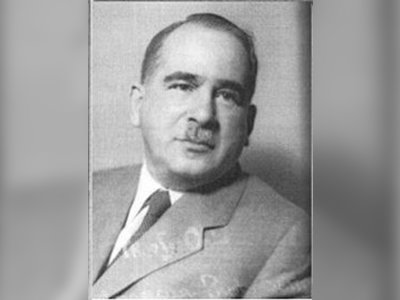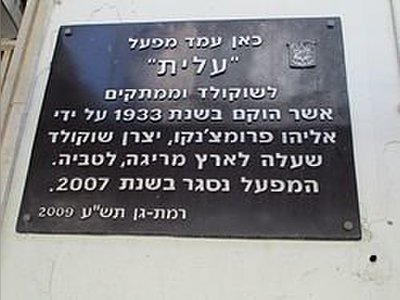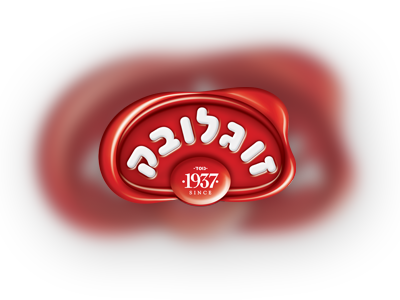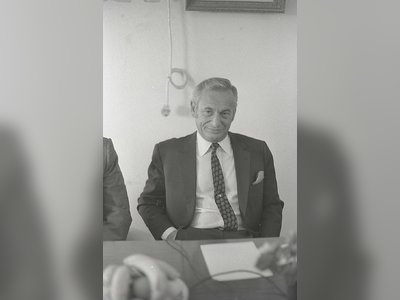מורשת גדולי האומה
בזכותם קיים
beta
Ephraim Eilin: Pioneer of Israel's Automotive Industry
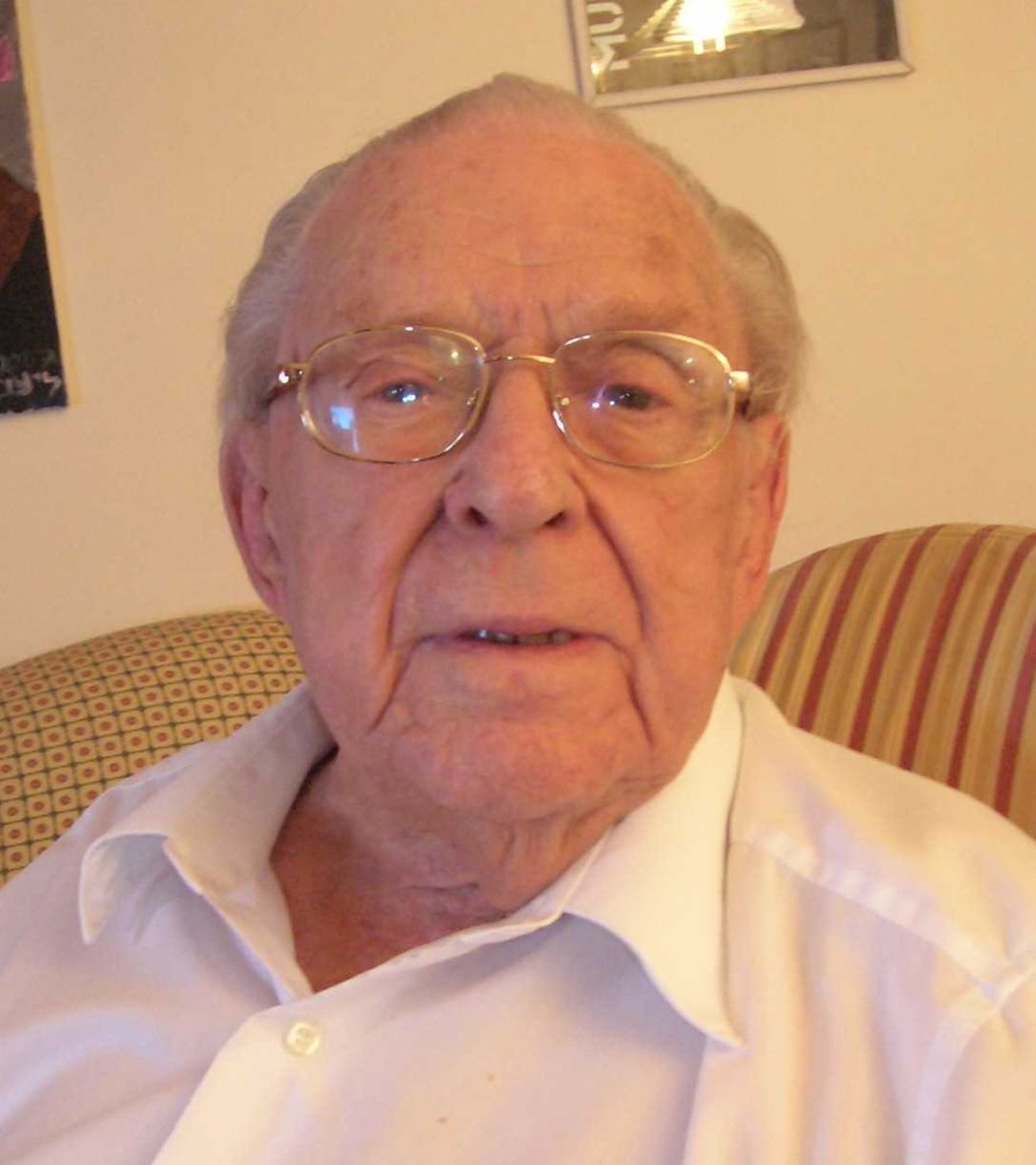
Ephraim Eilin was born on February 20, 1912, in the city of Kharkov, Ukraine, to Joseph Eilin and Esther Konikov. He came from a traditional and Zionist family background. His father was an industrialist and a community leader in Kharkov. From the age of six, Hebrew was spoken in their home. Within their community, they established a cultural school in secrecy, printed books themselves, and conducted their studies in the Hebrew language. Eilin was an active member of the Zionist youth group formed by the Kharkov community.
In 1924, the family immigrated to Palestine and settled in Kibbutz Nes Ziona, where his father acquired a citrus grove. Eilin attended the Herzliya Hebrew Gymnasium, graduating as part of its 18th class. However, he completed his final year of studies at the Rishon LeZion Gymnasium. He played in the forest orchestra as part of the school's music program under the guidance of music teacher Hanina Karchevsky. Among other events, he performed with the orchestra at the opening ceremony of the Hebrew University in Jerusalem in 1925.
Involvement with Beitar and Haganah
In the years 1926-1927, Eilin was actively involved with the Beitar organization and collaborated closely with Menachem Begin, the first Beitar leader in Palestine. In 1928-1929, he was active in one of the civilian defense groups formed by Jeremiah Halperin, which would later become the core of the Irgun (Etzel). In 1929, on Tisha B'Av, he stood guard with his comrades for the safety of Jewish worshipers at the Western Wall, an event that would lead to the events of the 1929 Arab riots.
Following the 1929 events, Eilin went to Belgium for studies with the support of his father, where his sister also resided. From 1929 to 1932, he studied and earned a degree in economics and commerce (Licencié en Science Commerciales) at the University of Liège in Belgium. During his time in Belgium, he served as the head of the Revisionist Party in Liège and was a central figure of the party in Belgium. He frequently met with Ze'ev Jabotinsky in Paris and was close to the party's circles during that period. In the same year, he returned to Palestine and engaged in citrus fruit trade until 1935. During this time, he also served as the CEO of the "Colonization and Settlement" company. In 1934, he married Tzippora, the daughter of Meir Antin.
Involvement with the Irgun
In 1938, Abraham Stern recruited Ephraim Eilin into the Irgun, and he was among its founding members, directly subordinate to Abraham Stern and David Raziel. Eilin was sent as an emissary to the first Congress of the New Zionist Organization (Hebrew: ההסתדרות הציונית החדשה, abbreviated as HaHistadrut HaTzionit HaChadasha or HaHistadrut HaTzionit HaRevizionit) and was among the organization's early activists in Europe. He had a direct connection with the Irgun's commander, David Raziel, and its deputy commander, Abraham Stern (Yair). He was given special tasks, including the operation to rescue immigrants on the shores of Netanya, where he assisted Yosef Kremnitzky, who was responsible for this area within the Irgun. Eilin recruited Sergeant Davis Walsh, the commander of the British police guard ships, who cooperated with the organization.
Suspicion and the David Raziel Affair
On May 19, 1939, Eilin and Raziel flew from Tel Aviv to Haifa to meet with Pinchas Rosenburg, the head of the National Committee. According to Eilin, an Arab police officer recognized Raziel's face and arrested him. Following this incident, suspicion arose among Irgun members that Eilin had betrayed Raziel to the British authorities. These suspicions haunted Eilin for years.
Years later, in 1960, at Eilin's request, Menachem Begin initiated the establishment of an internal inquiry committee within the Herut movement, led by Yohanan Bader, Eliyahu Lankin, and Eliyahu Meridor. The latter two eventually resigned from the committee, leaving Bader alone to clear Eilin of all suspicion. Bader's conclusion stated, "Ephraim Eilin has been wronged deeply by the rumors mentioned above, and there was no basis for them. He is deserving of our trust as a loyal and honest comrade, and I share this view." Nevertheless, suspicions against Eilin persisted among various individuals associated with the Irgun, such as Eli Tavin and Avraham Haikevitz, who was a commander in the Tel Aviv Irgun. According to intelligence officer Yaakov Amaromi, part of the motivation for Eilin's offer of assistance to the Irgun in 1948 was a desire to clear his name and a fear of the death penalty awaiting him.
On the other hand, many veterans of the Irgun and Lehi who disqualified Eilin from having arrested Raziel had a different view. The saga of Ephraim Eilin's involvement in the David Raziel affair would continue to be a subject of controversy for years to come.
Involvement with Beitar and Haganah
In the years 1926-1927, Eilin was actively involved with the Beitar organization and collaborated closely with Menachem Begin, the first Beitar leader in Palestine. In 1928-1929, he was active in one of the civilian defense groups formed by Jeremiah Halperin, which would later become the core of the Irgun (Etzel). In 1929, on Tisha B'Av, he stood guard with his comrades for the safety of Jewish worshipers at the Western Wall, an event that would lead to the events of the 1929 Arab riots.
Following the 1929 events, Eilin went to Belgium for studies with the support of his father, where his sister also resided. From 1929 to 1932, he studied and earned a degree in economics and commerce (Licencié en Science Commerciales) at the University of Liège in Belgium. During his time in Belgium, he served as the head of the Revisionist Party in Liège and was a central figure of the party in Belgium. He frequently met with Ze'ev Jabotinsky in Paris and was close to the party's circles during that period. In the same year, he returned to Palestine and engaged in citrus fruit trade until 1935. During this time, he also served as the CEO of the "Colonization and Settlement" company. In 1934, he married Tzippora, the daughter of Meir Antin.
Involvement with the Irgun
In 1938, Abraham Stern recruited Ephraim Eilin into the Irgun, and he was among its founding members, directly subordinate to Abraham Stern and David Raziel. Eilin was sent as an emissary to the first Congress of the New Zionist Organization (Hebrew: ההסתדרות הציונית החדשה, abbreviated as HaHistadrut HaTzionit HaChadasha or HaHistadrut HaTzionit HaRevizionit) and was among the organization's early activists in Europe. He had a direct connection with the Irgun's commander, David Raziel, and its deputy commander, Abraham Stern (Yair). He was given special tasks, including the operation to rescue immigrants on the shores of Netanya, where he assisted Yosef Kremnitzky, who was responsible for this area within the Irgun. Eilin recruited Sergeant Davis Walsh, the commander of the British police guard ships, who cooperated with the organization.
Suspicion and the David Raziel Affair
On May 19, 1939, Eilin and Raziel flew from Tel Aviv to Haifa to meet with Pinchas Rosenburg, the head of the National Committee. According to Eilin, an Arab police officer recognized Raziel's face and arrested him. Following this incident, suspicion arose among Irgun members that Eilin had betrayed Raziel to the British authorities. These suspicions haunted Eilin for years.
Years later, in 1960, at Eilin's request, Menachem Begin initiated the establishment of an internal inquiry committee within the Herut movement, led by Yohanan Bader, Eliyahu Lankin, and Eliyahu Meridor. The latter two eventually resigned from the committee, leaving Bader alone to clear Eilin of all suspicion. Bader's conclusion stated, "Ephraim Eilin has been wronged deeply by the rumors mentioned above, and there was no basis for them. He is deserving of our trust as a loyal and honest comrade, and I share this view." Nevertheless, suspicions against Eilin persisted among various individuals associated with the Irgun, such as Eli Tavin and Avraham Haikevitz, who was a commander in the Tel Aviv Irgun. According to intelligence officer Yaakov Amaromi, part of the motivation for Eilin's offer of assistance to the Irgun in 1948 was a desire to clear his name and a fear of the death penalty awaiting him.
On the other hand, many veterans of the Irgun and Lehi who disqualified Eilin from having arrested Raziel had a different view. The saga of Ephraim Eilin's involvement in the David Raziel affair would continue to be a subject of controversy for years to come.
